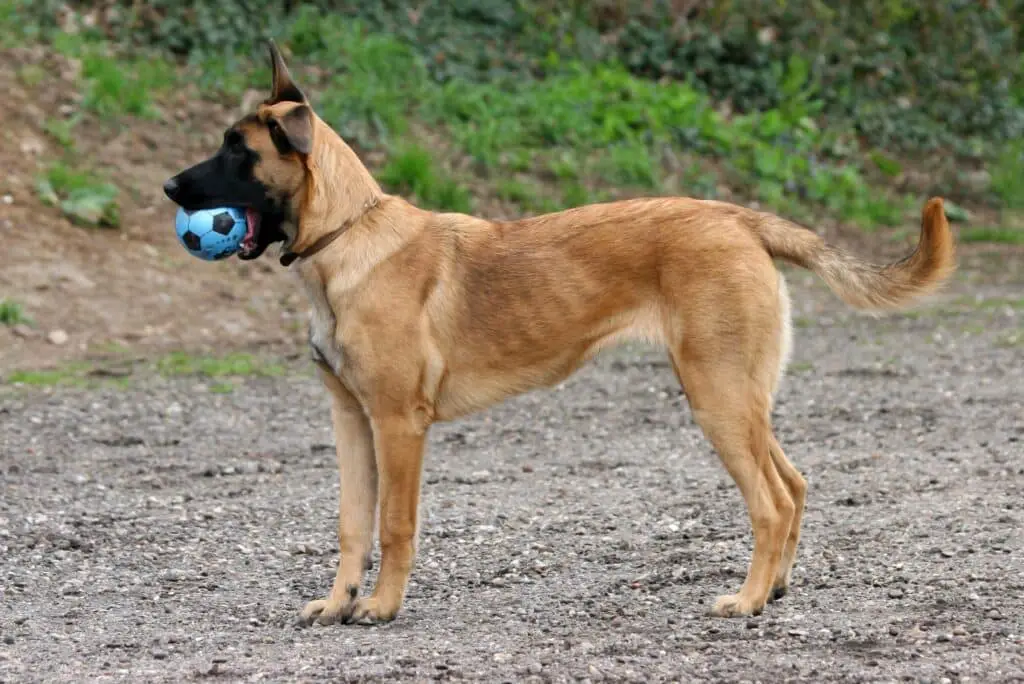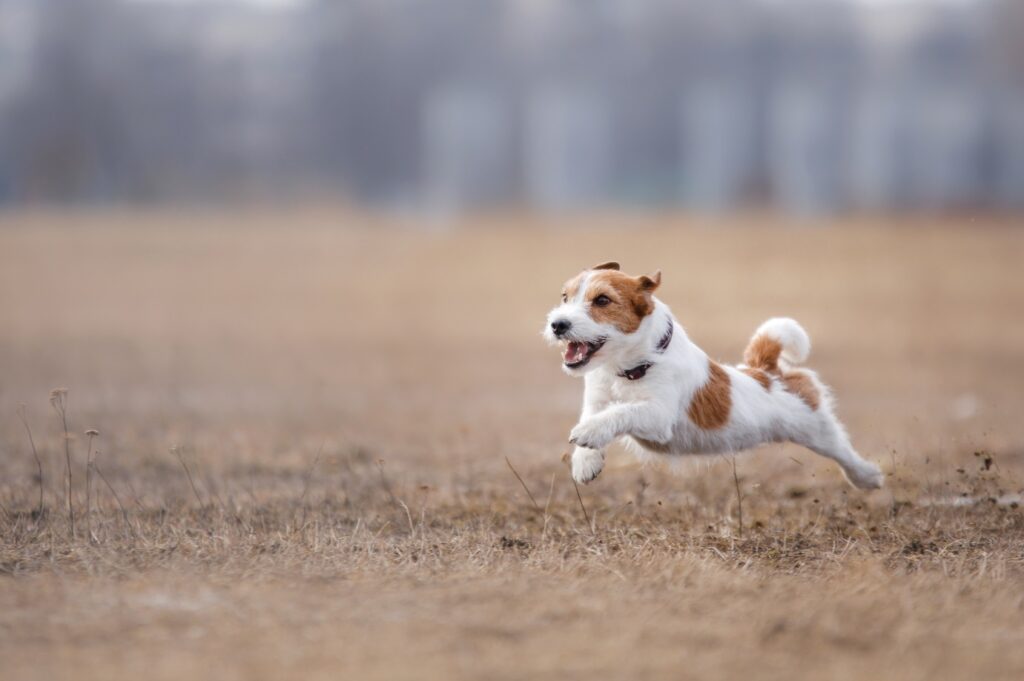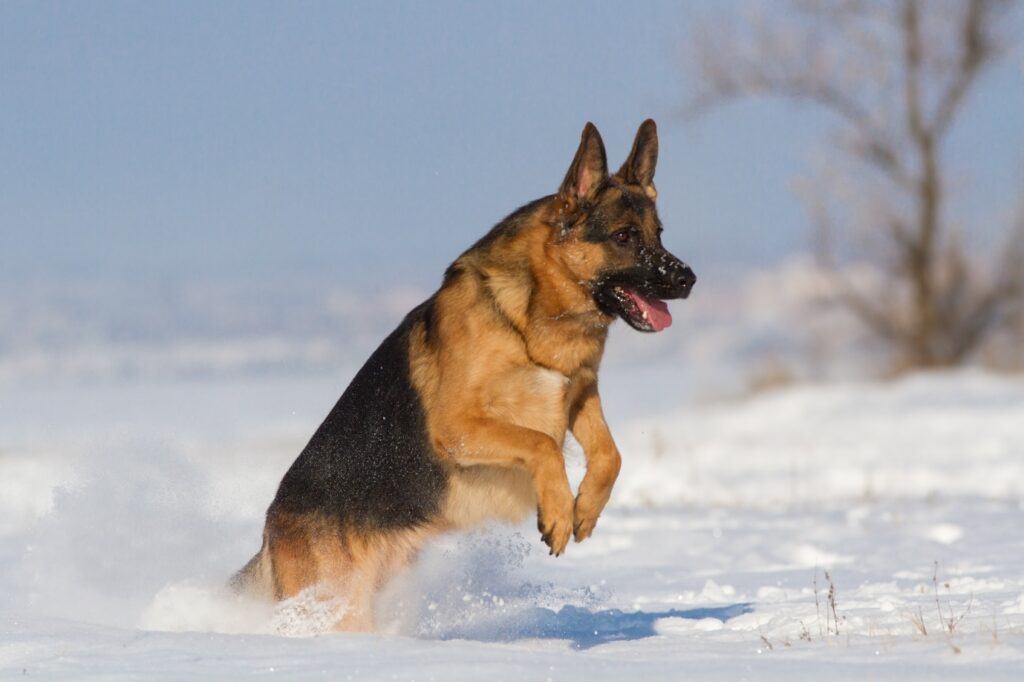The German Shepherd Terrier Mix is a new breed that is quickly gaining in popularity. This hybrid dog combines the best of both worlds, inheriting the intelligence and obedience of the German Shepherd and the athleticism and playful temperament of the Jack Russell Terrier.
If you’re thinking about adding one of these dogs to your family, here are 19 fun facts you should know about them!
Breeding History of Parent Breeds
In order to understand the German Shepherd Terrier Mix, it is best to look at both parent breeds in order to recognize the key differences.
German Shepherd:
The German Shepherd is a popular breed of dog that is known for its loyalty and obedient nature. Originating in Germany, the German Shepherd was originally bred as a working dog for herding sheep.
However, the breed quickly became popular with police and military forces due to their trainability and intelligence.
German Shepherds are now one of the most popular breeds of dogs in the world, and they are often used as service dogs or companion animals.
Known for their loyalty, strength, and courage, German Shepherds make excellent pets for families with active lifestyles.
Jack Russell Terrier:
Jack Russell Terriers are a breed of dog that was originally developed in England in the 1800s. The breed was named after a man named Jack Russell, who was an avid hunter and is credited with developing the first dogs that we would recognize as Jack Russell Terriers.
These dogs were bred for their hunting abilities, and they quickly became popular among other hunters. In the early 1900s, the Jack Russell Terrier was brought to America, where they became one of the most popular breeds of dogs.
Today, Jack Russell Terriers are still used as hunting dogs, but they are also popular as pets. They are known for their high energy level, their intelligence, and their loyalty.
German Shepherd Terrier Size and Features
The German Shepherd Terrier mix is a hybrid dog that is created by crossing a German Shepherd with a Terrier. This mix can range in size from small to large, depending on the size of the parents.
German Shepherd Terriers are typically medium to large dogs, with males averaging between 65 and 90 pounds and females averaging between 50 and 70 pounds. They also have a variety of coat types, including short, medium, and long.
German Shepherd Terrier Coat & Colors

The German Shepherd Terrier Mix has a thick, double coat that can be medium to long in length. The undercoat is soft and dense, while the outer coat is coarser and longer.
The most common coat colors for this mix are black and tan, but they can also be black, gray, cream, white, or even brindle. Some dogs may have markings on their face, chest, or legs.
German Shepherd Terrier Mixes are moderate shedders and will require regular grooming to keep their coats healthy and free of mats. This mix is not suitable for homes with allergy sufferers.
German Shepherd Terrier Temperament
The German Shepherd Terrier is a loyal and fearless breed of dog that is known for its protective nature. Originally bred as working dogs, German Shepherd Terriers have a strong work ethic and are intelligent and trainable.
They are confident and assertive, but also social and loving with their family and friends. While they are active dogs that need plenty of exercise, they make great companion animals for an active family.
German Shepherd Terrier Training Needs
The German Shepherd Terrier is an intelligent, active breed that excels at obedience and working trials. They are also known for their loyalty and protective nature, making them excellent guard dogs.
German Shepherd Terriers need a great deal of training, and they are best suited to homes with large yards or access to nearby parks or trails.
Their owners should be prepared to commit to several daily walks or runs, as well as regular opportunities for playtime and socialization.
These dogs are quick learners, but they can also be stubborn, so consistent training is essential. German Shepherd Terriers need firm, patient handling to flourish, but with proper guidance, they can be great companions.
German Shepherd Terrier Aggression Levels
German Shepherd Terrier mixes are known to be intelligent, loyal, and protective dogs. They make excellent family pets and are particularly well-suited for homes with children.
However, this mixed breed can also be aggressive, especially if they feel threatened or protective of their family.
In general, the aggression levels of German Shepherd Terrier mixes depend on a number of factors, including their ownership history, socialization experience, and overall temperament.
With proper training and socialization, however, this mixed breed can learn to control their aggression and become loving and gentle companions.
German Shepherd Terrier Exercise Needs

German Shepherd Terrier Mixes are high-energy dogs that require a lot of exercise. A minimum of one hour of exercise per day is recommended, although two hours would be ideal.
This can include walks, runs, fetch, and other activities that will keep your dog mentally and physically stimulated.
German Shepherd Terrier Mixes are typically very playful, so it’s important to make sure they have a regular outlet for their pent-up energy.
Otherwise, they may become destructive or start barking excessively. If you’re not able to provide them with the exercise they need, it’s best to consider another breed.
German Shepherd Terrier Mental Stimulation
German Shepherds are known for their intelligence, loyalty, and trainability. They are often used as working dogs in a variety of settings, such as law enforcement and search and rescue.
As a result, they require a great deal of mental stimulation to stay happy and healthy. A German Shepherd Terrier mix is likely to inherit these same traits.
An owner should be prepared to provide their dog with plenty of opportunities for mental stimulation, such as interactive toys, daily walks or runs, and training exercises. By doing so, they can help their dog to lead a happy and fulfilling life.
German Shepherd Terrier Grooming Needs
These mixed-breed dogs need a regular grooming routine to keep their coat healthy and clean. The good news is that German Shepherd Terriers are relatively easy to groom. Their coat is composed of two layers: a dense undercoat and a shorter outer coat.
The undercoat helps to protect the dog from cold weather, while the outer coat repels water and dirt. Weekly brushing will help to remove loose hair and prevent mats from forming. German Shepherd Terriers also need to be bathed on a regular basis, typically every two to four weeks.
In addition, their nails should be trimmed regularly, and their teeth should be brushed daily. By following these simple grooming tips, you can keep your German Shepherd Terrier looking and feeling his best.
German Shepherd Terrier Health Conditions
Like all hybrid dogs, the German Shepherd Terrier mix can inherit health conditions from either or both parent breeds.
The most common health issues seen in German Shepherd Terrier mixes include;
- Hip and elbow dysplasia are two conditions that cause the joints to develop abnormally. This can lead to pain and lameness. Fortunately, both conditions can be managed with medication and surgery, if necessary.
- Von Willebrand’s disease is another condition that can be inherited from either parent breed. It is a blood disorder that prevents clotting, which can cause excessive bleeding during surgery or after an injury.
- German Shepherd Terrier mixes are also prone to allergies, which can cause itching, redness, and hair loss.
Fortunately, many treatment options are available for dogs with allergies, including special shampoos, steroids, and allergy shots. With proper care, most German Shepherd Terrier mixes can lead long, healthy lives.
German Shepherd Terrier Nutrition Needs

As any pet owner knows, nutrition is an important part of keeping your animal healthy. Different animals have different nutritional needs, and it’s important to make sure you’re feeding your pet the right food.
If you have a German Shepherd Terrier mix, there are a few things you should keep in mind when it comes to nutrition. German Shepherds are known for being active dogs, so your mix will likely need a lot of calories to maintain its energy levels.
Make sure to choose a high-quality food that is rich in proteins and fats. You should also avoid foods that are high in carbohydrates, as this can lead to weight gain.
German Shepherd Terrier Dog Friendliness
One of the great things about German Shepherd Terrier mixes is that they are typically very dog-friendly. This means that they usually get along well with other dogs, even if they’ve never met before.
Of course, every dog is different, and some may be more reserved around other dogs than others.
However, in general, these mixes make great playmates for other canines. They also tend to do well in social situations, such as dog parks and doggy Daycare.
So, if you’re looking for a dog who will get along well with your existing furry friend, a German Shepherd Terrier mix might be a great option for the family home.
German Shepherd Terrier Child Friendliness

German Shepherd Terrier mixes are also very good with children. This is likely due to their German Shepherd heritage. German Shepherds are known for being loyal and protective, two traits that can be beneficial when it comes to kids.
Of course, as with any dog, it’s important to introduce your German Shepherd Terrier mix to children gradually and supervise them when they are together. With proper socialization, German Shepherd Terrier mixes can make great playmates for kids of all ages.
German Shepherd Terrier Drooling Levels
One potential downside of these dogs is that they tend to drool a lot. This is because their jowls are quite long, making it difficult for them to keep saliva in their mouths.
As a result, German Shepherd Terrier mix owners often find themselves wiping drool off of their dogs’ faces. However, this is generally considered to be a small price to pay for the companionship of these amazing animals.
German Shepherd Terrier Barking Levels
While this mix can take on some characteristics of either parent breed, one thing that is generally consistent among German Shepherd Terrier mixes is their high level of barking. This is often due to the German Shepherd’s natural instinct to bark as a form of communication.
German Shepherds are very intelligent and easily trained, so this trait can be directed towards other forms of communication, such as barking at strangers or animals that they perceive as a threat.
However, if not properly trained, a German Shepherd Terrier mix can become excessively vocal, making them an unsuitable choice for some households.
If you are considering adding a German Shepherd Terrier mix to your family, be sure to do your research and find a reputable trainer who can help you manage their barking behavior.
German Shepherd Terrier Weather Tolerance

German Shepherd Terriers are bred to be working dogs, so they are very tolerant of all kinds of weather conditions. This includes both hot and cold weather.
German Shepherds were originally bred in Germany, where the climate can range from freezing cold winters to hot summers.
As a result, these dogs have a thick double coat that helps them regulate their body temperature in extreme conditions. German Shepherd Terriers are also known for their high level of energy, which means they don’t mind being active even in hot weather.
However, it’s important to make sure that your German Shepherd Terrier mix has access to plenty of water and shade when it’s warm outside.
German Shepherd Terrier Life Expectancy
German Shepherd Terriers have a life expectancy of about 9 to 14 years. This is on the shorter side for dogs, but it’s important to remember that mixed breeds often have a slightly shorter life expectancy than purebreds.
German Shepherds are also known for being prone to certain health conditions, such as hip and elbow dysplasia, which can shorten their lifespan.
German Shepherd Terrier mixes may be less likely to develop these conditions, but it’s still important to talk to your veterinarian about the potential health risks of this breed.
German Shepherd Terrier AKC Recognition
The German Shepherd Terrier is not currently recognized by the American Kennel Club. However, this breed is recognized by the United Kennel Club and the National Kennel Club.
German Shepherd Terriers are also eligible for registration with the American Mixed Breed Obedience Registry and the International Canine Association.
German Shepherd Terrier Puppy Prices
German Shepherd Terrier puppies can cost anywhere from $600. The price of these dogs depends on several factors, including the breeder’s reputation, the dog’s lineage, and whether or not they are AKC registered.
German Shepherd Terriers that are mixed with another breed may be less expensive than purebreds, but they can still be quite costly.
German Shepherd Terriers are not the right breed for everyone, but if you are prepared to invest the time and money into training and care, they can make wonderful companions.
You may also be interested in – Blue Heeler Shepherd Mix – Everything You Need to Know!
Final Thoughts
German Shepherd Terriers are intelligent, loyal, and protective dogs that make great additions to many families. However, they require a lot of exercise and training, and their high level of barking can be problematic for some households.
As outlined, they are prone to certain health conditions, which can shorten their lifespan. If you are considering adding a German Shepherd Terrier to your family, be sure to do your research and find a reputable breeder.
While this mixed breed can be expensive, they make wonderful companions for those who are prepared to invest the time and money into their care.


